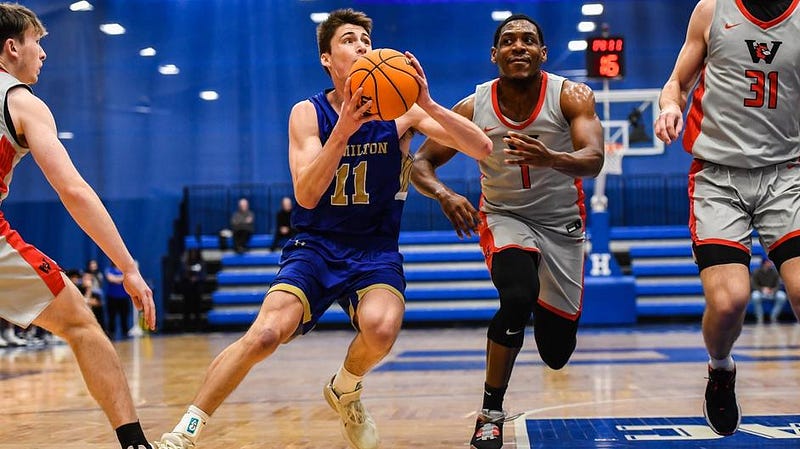
Backed by a supportive and enthusiastic crowd of relatives, Hamilton students and alumni, the Men’s Basketball team defeated the Montclair State Red Hawks in an impressive 84–75 performance. Hamilton was led by the efficient shooting of Conner Rood ’23, who piled on 22 points on 9/11, a 15-point performance by Hank Morgan ’25, a 10-point performance by Teja Singh ’25 and an 11-point performance by Eric Andersen ’23 coming off the bench. An energized performance on both sides of the ball allowed Head Coach Adam Stockwell’s team to advance to the NCAA tournament second round for a meeting with Johns Hopkins.
The first half ended with Hamilton leading 46–43, both teams shooting better than 60% from the field and better than 40% from three-point range, with the Continentals’ slight rebounding advantage giving them the edge. It was an offensive struggle, and neither team showed any signs of slowing down. However, in the second half, fueled by continued impressive shooting and exceptional defense in the paint, the Continentals were able to put together a run. They took a commanding lead of 11 points with nine minutes remaining, and Montclair State would never regain the upper hand. Rood sealed the win with his second three-point shot of the day with 2:40 left in the game, putting Hamilton ahead by nine. The Continentals used the momentum of the 13–2 run — beginning with 13 minutes left in the game — to bring them to victory. They also hung their hats on a second half defensive effort, with numerous players tallying blocks by the end of the game, led by Graham Robinson ’25 with two rejections.
Montclair State ran a full-court press for the entire game, putting constant pressure on the Hamilton as they tried to work their way up the court. The constant factor of the press gave the game a frantic, back-and-forth feel from the start. The Red Hawks came in with the clear goal of speeding the game up, while the Continentals slowed it down at every opportunity. Aside from a rare turnover, Hamilton was very effective in breaking the press, passing out of traps and double teams to the open player. There were several times, including during pivotal moments in the second half, when Hamilton found wide-open shots because of this penetration and quick decision-making. After the game, Coach Stockwell commented, “I’ll tell you, if you told me we were going to have eight turnovers at the end of this game, I’d take that in a heartbeat…They were aggressive when the opportunities presented themselves, but didn’t get reckless and out of control and go too fast.” Because the press was not effective in producing turnovers, it instead slowed down the pace of the game, which played into Hamilton’s hands. This slow pace, which caused most of the Continentals’ shots to be taken with only seconds left on the shot clock, cost Montclair State precious time — which they desperately needed at the end of the game, as they tried to reduce the deficit.
In a game where neither team committed many turnovers — eight on both sides — the biggest difference was the Continentals’ exceptional shot-making. Hamilton ended the game shooting an immaculate 44.4% from three and 58.9% from the field, allowing them to produce an incredible 84 points. Coach Stockwell’s team shot incredibly efficiently from inside the arc and attempted more than double the total free throws of Montclair State. Both teams’ benches made important contributions, as well, with Hamilton’s bench contributing 21 points — a quarter of their total for the game. Capitalizing on the Red Hawks’ second half shooting slump, maintaining scoring efficiency and continuing to break through the press gave the Continentals the advantage they needed to reach their eighth second-round appearance of the NCAA Championship, and third appearance in the second round under the leadership of Coach Stockwell.
This incredible season came to an end the next day, as Hamilton fell to Johns Hopkins, 81–71. Yet, after a first NESCAC championship in program history and a win in the NCAA tournament, the Continentals created a run to remember for a long time.
























